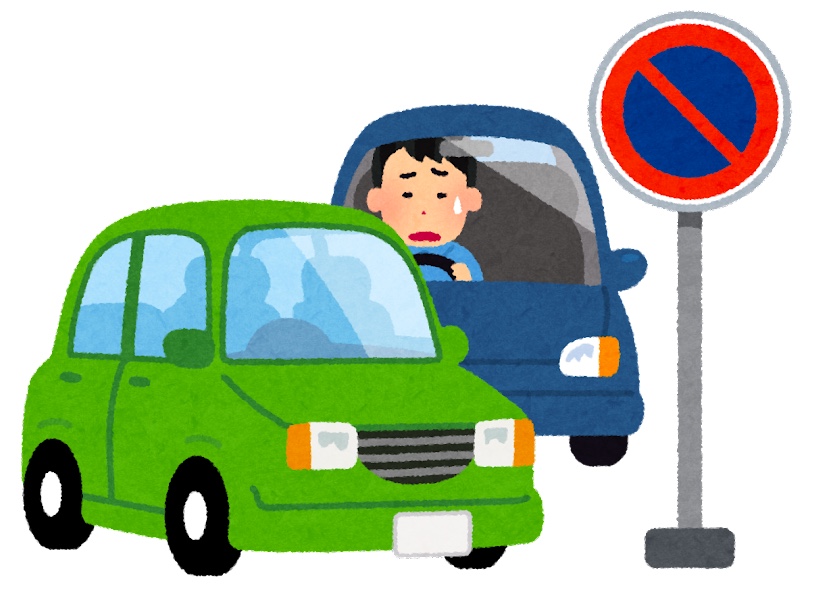If a stranger’s car is parked without permission in your parking lot or on your private property, dealing with the car on your own is “self-help,” which is prohibited by current law. What measures should be taken to deal with such unauthorized parking?
Laws on Unauthorized Parking
For unauthorized parking on public roads, Article 44 of the Road Traffic Law states, “No vehicle shall be stopped or parked on any part of the road where stopping or parking is prohibited by road signs, etc., or on any other part of the road listed below, except in accordance with the provisions of the law or orders of police officers, or when a temporary stop is made to prevent danger.” As explained in the law, it is a clear violation of the law.
However, there is no law in the Road Traffic Law or the Penal Code that clearly prohibits such violations, and most cases are handled as “torts” under the Civil Code.
Article 709 of the Civil Code stipulates as a tort, “A person who intentionally or negligently infringes the rights or legally protected interests of another shall be liable to compensate for damages caused thereby,” and it is considered as an act that harms another’s land and it is liable to compensation.
However, although the owner of the car has a responsibility to compensate, whether or not the owner of the car actually compensates or is able to compensate depends in large part on the owner of the car, and just because a “tort” under the Civil Code is recognized does not mean the car can be moved immediately. In the first place, there is the problem that going to court takes a long time.
So, if you come across unauthorized parking on private land and want to take action, what should you do?
According to a police official, “Many individuals report unauthorized parking on private property to the police, but in reality, it is difficult for the police to deal with the situation.
It is difficult for the police to deal with unauthorized parking on private property because it is not a violation of the Road Traffic Law.
So, what kind of problems will arise if you hire a towing company to remove your car from private property, or if you move a car that has been parked without permission?
The above-mentioned person in charge of the situation stated the following: “Moving someone else’s car without permission, regardless of whether it is on a private property or not, may be considered property destruction or theft. As a result, it is generally preferable not to deal with the situation on your own.”
The crime of destruction of property is defined in Article 261 of the Penal Code as “anyone who damages or injures another person’s property shall be punished by imprisonment for not more than three years, or a fine of not more than 300,000 yen.
Similarly, Article 235 of the Penal Code defines “theft” as “a person who steals another person’s property shall be guilty of theft and shall be punished by imprisonment with work for not more than 10 years or a fine of not more than 500,000 yen.
In other words, the current legal interpretation seems to be that it is a little too risky for anyone other than the owner of the car to move it, even if it is a car that has entered private property without permission.
Unauthorized parking on private property and appropriate countermeasures
Is there no choice but to cry and sleep over unauthorized parking that has invaded private property in this way?
The aforementioned person in charge says, “One measure is to post a warning sign on private property so that people who park illegally can see it.
However, caution must be exercised when posting warning signs. If the warning is overly threatening or includes a demand for money, the user may be charged with the crime of “intimidation.
The crime of intimidation is punishable by imprisonment for not more than two years or a fine of not more than ¥300,000 under Article 222 of the Penal Code, which states, “A person who threatens to harm a person’s life, body, liberty, reputation, or property by threatening to do so shall be punished with imprisonment for not more than two years or with a fine of not more than ¥300,000.
In addition, if the owner of the car takes the liberty of putting this warning on the window or body part of the car in order to make it visible to the owner, he or she may be guilty of the aforementioned destruction of property.
Therefore, the aforementioned points must be taken into consideration when communicating a warning to the owner of a vehicle to the effect of “please do not park your vehicle on private property.
Furthermore, the above-mentioned person in charge says, “If you want to sue legally, it would be better to consult a lawyer” as an effective countermeasure against unauthorized parking on private property.
If you try to deal with unapproved parking on private property on your own, there is a risk of various problems such as those mentioned above.
Therefore, consulting a lawyer who is familiar with the law and suing legally is the safest and most advantageous way to deal with the situation.




Comments